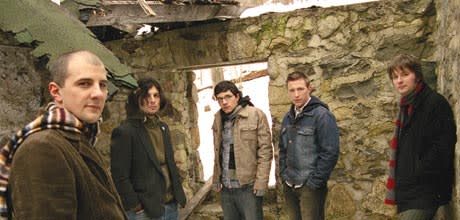With the gloomy, sepia-tinged war photos used for the artwork of Sleep Stations After The War, one would guess that they are some type of war-hungry metal band with trademark demonic vocals and shredded guitars. What a pleasant surprise it is to discover that After The War is nothing of the sort. Instead, it is a remarkable piece of work a concept album about World War II by a band that is described in their bio as a "sonic blast of 70s AM gold. Front-man Dave Debiaks vision is captured through his heartfelt lyrics, which reveal the varied thoughts of a solider deep in the trenches. Assuming the role of many different characters, Debiak explores the relationships that wait back home, the longing to return safely and the anticipation for it all to end. Recorded with a great deal of 1940s equipment, the songs travel up and down a trail of Teenage Fanclub harmonies, Wish You Were Here-era Pink Floyd atmospherics and the more sombre moods and arrangements of Wilco. Though it contains a rather serious tone, Sleep Station dont restrict themselves sonically. In amongst the hushed uppers and downers are some unexpected slices of optimistic jangle pop, such as the awe-inspiring "Caroline, London 1940 and the confessional "Silver In The Sun. How they pull off such a tricky transition is beyond me, but they do it without any hitches and the result is a masterful concept that deflects any accusations of pretension.
What inspired the war theme? I've always had an infatuation with the time period and the war. I was also moved by the events of today, and that might have affected me as well.
Did you conduct any research to help with the lyrics? Not with the lyrics. Still pictures really helped me get a certain feeling and I could write with that image somewhere in the back of my mind.
"A Final Prayer Pt. 1" is a pretty intense track to include with pop songs. What made you record something like that? I think the songs are just as intense, lyrically and musically. Some of the saddest, most intense songs I have ever heard were "pop" songs or "rock" songs and I have always loved the format of those songs for telling a short story. It is very traditional and I felt that really fit the time period well.
Your first release was also a concept record. Do you plan on sticking with this formula for future releases? Actually I never wrote anything from a concept record point of view. I was originally trying to film a movie and couldn't get the funds, so I decided to score it. I would write the music I felt would best convey the scene musically as opposed to cinematically.
(Eyeball)What inspired the war theme? I've always had an infatuation with the time period and the war. I was also moved by the events of today, and that might have affected me as well.
Did you conduct any research to help with the lyrics? Not with the lyrics. Still pictures really helped me get a certain feeling and I could write with that image somewhere in the back of my mind.
"A Final Prayer Pt. 1" is a pretty intense track to include with pop songs. What made you record something like that? I think the songs are just as intense, lyrically and musically. Some of the saddest, most intense songs I have ever heard were "pop" songs or "rock" songs and I have always loved the format of those songs for telling a short story. It is very traditional and I felt that really fit the time period well.
Your first release was also a concept record. Do you plan on sticking with this formula for future releases? Actually I never wrote anything from a concept record point of view. I was originally trying to film a movie and couldn't get the funds, so I decided to score it. I would write the music I felt would best convey the scene musically as opposed to cinematically.




